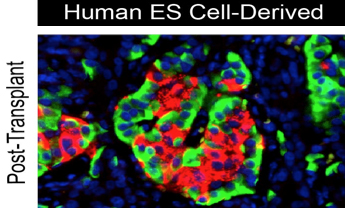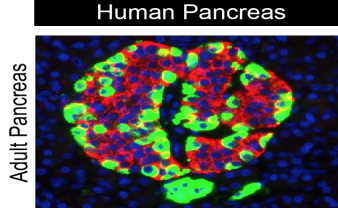University of British Columbia scientists, in collaboration with an industry partner, have successfully reversed diabetes in mice using stem cells, paving the way for a breakthrough treatment for a disease that affects nearly one in four Canadians.
The research by Timothy Kieffer, a professor in the Department of Cellular and Physiological Sciences, and scientists from the New Jersey-based BetaLogics, a division of Janssen Research & Development, LLC, is the first to show that human stem cell transplants can successfully restore insulin production and reverse diabetes in mice. Crucially, they re-created the “feedback loop” that enables insulin levels to automatically rise or fall based on blood glucose levels. The study is published online today in the journal Diabetes.
 |
 |
| Transplanted embryonic stem cell-derived islets (above) ended up looking very similar to typical adult pancreatic islets (below). Red-coloured cells are producing insulin. |
After the stem cell transplant, the diabetic mice were weaned off insulin, a procedure designed to mimic human clinical conditions. Three to four months later, the mice were able to maintain healthy blood sugar levels even when being fed large quantities of sugar. Transplanted cells removed from the mice after several months had all the markings of normal insulin-producing pancreatic cells.
“We are very excited by these findings, but additional research is needed before this approach can be tested clinically in humans,” says Kieffer, a member of UBC’s Life Sciences Institute. “The studies were performed in diabetic mice that lacked a properly functioning immune system that would otherwise have rejected the cells. We now need to identify a suitable way of protecting the cells from immune attack so that the transplant can ultimately be performed in the absence of any immunosuppression.”
The research was supported by the Canadian Institutes of Health Research, the Stem Cell Network of Canada, Stem Cell Technologies of Vancouver, the JDRF and the Michael Smith Foundation for Health Research.
Diabetes results from insufficient production of insulin by the pancreas. Insulin enables glucose to be stored by the body’s muscle, fat and liver and used as fuel; a shortage of insulin leads to high blood sugar that raises the risk of blindness, heart attack, stroke, nerve damage and kidney failure.
Regular injections of insulin are the most common treatment for the type 1 form of this disease, which often strikes young children. Although experimental transplants of healthy pancreatic cells from human donors have shown to be effective, that treatment is severely limited by the availability of donors.